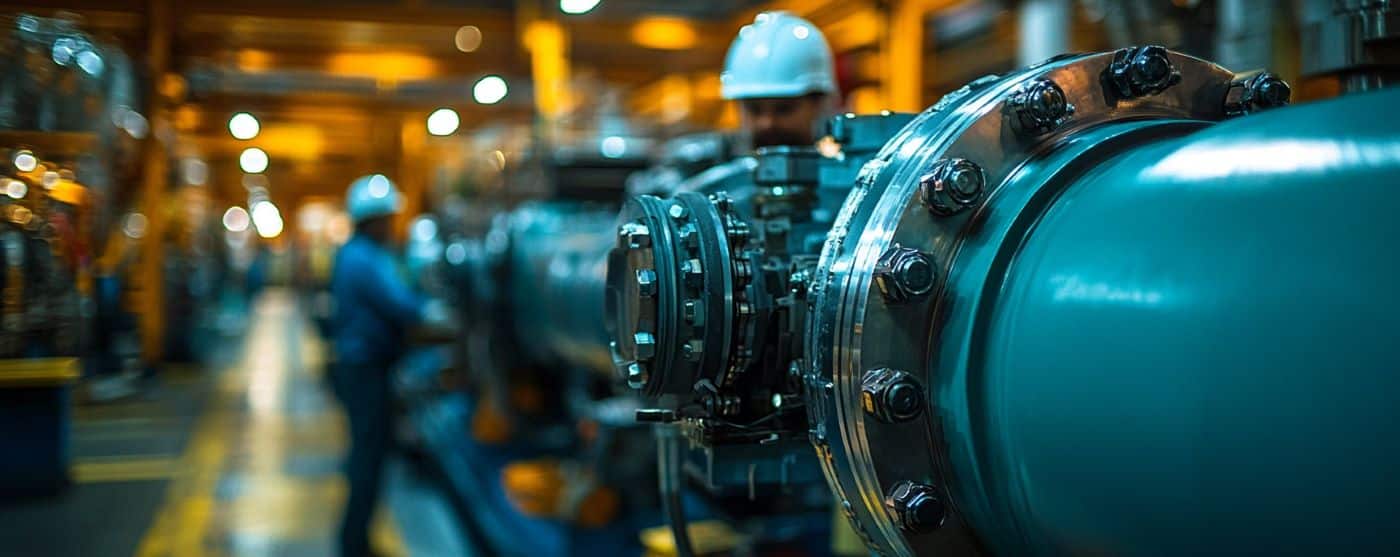
- What is Thermal Engineering?
- Master’s in Thermal Engineering Online Program Overview
- Why Earn an Online Master’s Degree in Thermal Engineering?
- Master’s in Thermal Engineering Curriculum and Common Courses
- Accreditation for Master’s in Thermal Engineering Degree Programs
- What Can I Do with a Master’s Degree in Thermal Engineering?
- How Much do Thermal Engineering Graduates Make?
- Continuing Education After a Master’s in Thermal Engineering
- Scholarship and Financial Aid Information
- Internships
- FAQ (Frequently Asked Questions)
- How Much Does a Master’s in Thermal Engineering Cost?
- Is a Master’s in Thermal Engineering Degree Worth It?
- How Long Does it Take to Earn an Online Master’s Degree in Thermal Engineering?
- Is a Master’s Degree Required to Advance in Thermal Engineering?
- Are Thermal Engineering Jobs in Demand?
- What Industries Are Hiring Thermal Engineering Graduates that have a Master’s Degree?
- Is an Online Master’s in Thermal Engineering the same as an On-Campus Degree?
Getting a master’s in thermal engineering can open the doors to a wide range of exciting career opportunities, allowing you to work on ground-breaking projects that positively impact the world.
Depending on the path you take, you might find yourself designing more efficient renewable energy systems, optimizing automotive engines, or making a tangible contribution to sustainable development and leaving a lasting impact on future generations.
In the following sections, we’ll break down what you can expect from a thermal engineering master’s degree program.
You’ll learn about different concentrations you can focus on, such as heat transfer, thermofluids, and combustion, and we’ll discuss coursework, research opportunities, and how to choose the right program for you.
By the end of this guide, you’ll have a comprehensive understanding of what it takes to earn a master’s in thermal engineering and how it can propel your career into new heights – quite literally, we might add, as some graduates have even worked on cutting-edge space programs.
It’s time to dive into the ins and outs of this dynamic field and help you unlock your full potential as an engineer for a better tomorrow.
What is Thermal Engineering?
A master’s degree in thermal engineering covers a wide range of specialized topics within mechanical engineering discipline. After all, this is a master’s degree program designed to train engineering professionals so that they can safely and efficiently solve problems related to thermal energy.
Your work as a thermal engineer will likely focus on the following: energy systems and resources, numerical and experimental methods in thermal engineering, heat and mass transfer, fluid dynamics, heaters and coolers, the design of thermal systems and equipment, and other related topics.
Generally, this degree program strives to produce capable professionals who are experts in scientific and technical knowledge, and have all the skills required to analyze engineering problems related to fluid dynamics and thermal energy.
Master’s in Thermal Engineering Online Program Overview
While studying for an engineering master’s degree, you can expect to cover a large variety of topics in your courses, ranging from heat transfer, thermodynamics, fluid mechanics, and much more. Since this is a graduate program, you’ll learn these concepts at an even greater, more advanced level, preparing you for mastery in your field.
As you progress through your degree program, you’ll be able to choose from many different concentrations that allow you to tailor your studies to your specific interests and career goals.
Some of the concentrations you can choose to focus your studies on include:
Renewable Energy Systems:
Focus on harnessing clean and sustainable energy sources, such as solar and wind power, and study the principles of converting and utilizing these resources efficiently to reduce dependence on fossil fuels and minimize environmental impact.
Thermal Power Plants:
Learn about the intricacies of power generation systems, including fossil fuel-based plants, nuclear reactors, and combined cycle plants. You’ll explore ways to optimize plant efficiency and minimize emissions while ensuring safe and reliable operations.
Heat Exchangers:
Learn about the different types of heat exchangers and their applications in many industries. Dive into the design, fabrication, and optimization of heat exchangers for efficient thermal management.
Automotive Thermal Management:
Learn about heat management systems used in automobiles, such as cooling and heating systems for engines, battery packs, and passenger cabins. Find out how to optimize vehicle thermal performance for improved efficiency, reliability, and overall performance.
Why Earn an Online Master’s Degree in Thermal Engineering?
If you’re debating whether or not you should pursue your thermal engineering degree online, there are several direct benefits you should be aware of.
First off, the convenience of an online degree is unmatched. Remember when you had to scramble to find a parking spot before running to a lecture hall? With an online master’s program, you can bid those days goodbye.
You’ll have the ability to access course materials, lectures, and assignments at your own pace, from the comfort of your own home. Not to mention, this flexibility can be a game-changer if you’re juggling work, family, or other commitments.
Here’s a list of benefits you can take advantage of after earning an online master’s degree in thermal engineering:
- Flexibility: Access course materials and lectures on your schedule, allowing for greater work-life balance.
- Cost Savings: Save on housing, transportation, and other expenses associated with traditional on-campus programs.
- Networking Opportunities: Interact with fellow students and professionals from around the world through online forums and group projects.
- Career Advancement: Boost your resume and increase your earning potential with a specialized master’s degree in thermal engineering.
Earning an online master’s degree in thermal engineering not only offers you the convenience of learning at your own pace, but it also gives you the chance to forge a better future for us all.
Master’s in Thermal Engineering Curriculum and Common Courses
Let’s look at a list of graduate-level thermal engineering courses and challenging curriculums that’ll help shape your future as an expert in the field.
Thermal Engineering Curriculum & Common Courses
- Heat Transfer Fundamentals: This course teaches the mechanisms of heat transfer, including conduction, convection, and radiation, along with their applications in various industries and everyday life.
- Thermodynamics: A comprehensive study of the principles governing energy conversion and transformation between heat and work, essential for understanding numerous engineering processes and applications.
- Fluid Mechanics: An in-depth exploration of fluid behavior, including the motion of liquids and gases, as well as the forces acting upon them in natural and engineered systems.
- Computational Fluid Dynamics (CFD): Focuses on mathematical modeling and numerical techniques for simulating and analyzing fluid flow, using advanced software tools for practical problem-solving.
- Renewable Energy Systems: Investigates innovative and sustainable solutions for harnessing solar, wind, geothermal, and other forms of renewable energy to meet the growing demand for clean power sources.
- HVAC Design: Learn the intricacies of designing efficient heating, ventilation, and air conditioning systems for residential, commercial, and industrial applications, with a focus on energy conservation and indoor air quality.
- Combustion Engineering: Master the complexities of combustion processes, technologies, and equipment, including engines, turbines, and boilers, as well as their implications for emissions control and energy efficiency.
- Thermal Management in Electronics: Study techniques for optimizing cooling systems in electronic devices to ensure high performance, reliability, and longevity while preventing overheating problems.
- Heat Exchangers Design and Analysis: Covers the design principles, selection criteria, and performance evaluation of heat exchangers commonly used in industrial applications, focusing on optimization for energy efficiency.
- Cryogenics: Explore the techniques and challenges associated with low-temperature engineering, including refrigeration systems, cryogenic materials, and applications in the aerospace, medical, and research sectors.
- Two-Phase Flow and Heat Transfer: Learn about the theory and practice of heat transfer during boiling and condensation processes, critical for the design and operation of thermal systems, such as power plants and refrigeration systems.
- Advanced Thermodynamics: Dive deeper into the principles of thermodynamics with a focus on real gas behavior, chemical equilibrium, phase equilibria, and exergy analysis for advanced engineering applications.
- Solar Thermal Systems: Learn about the technologies and design principles behind solar thermal energy systems for heating and cooling applications, as well as electric power generation using concentrated solar power.
Accreditation for Master’s in Thermal Engineering Degree Programs
Accreditation helps ensure you receive a quality education that meets specific industry standards and prepares you for a successful career in your chosen field.
In this section, we’ll look further into the importance of accreditation, particularly the ABET accreditation, and how it impacts your future prospects in thermal engineering.
ABET Accreditation
When it comes to engineering degrees, ABET (Accreditation Board for Engineering and Technology) accreditation is the gold standard. Established in 1932 as the Engineers’ Council for Professional Development (ECPD), ABET is now a non-profit, non-governmental agency that accredits various programs in applied and natural science, computing, engineering, and engineering technology. Their rigorous evaluation process ensures that the program you choose is of the highest quality and equips you with the necessary knowledge and skills to excel in your career.
Choosing an ABET-accredited thermal engineering degree program is critical for several reasons.
First, many employers prefer hiring graduates from accredited programs, as it gives them confidence that you possess the appropriate technical knowledge and skills; some professional certifications and licensing boards may require an ABET-accredited degree.
Transferring credits or pursuing further education also becomes more manageable with an ABET-accredited degree. Other institutions tend to recognize these programs, making it easier for you if you decide to switch schools or pursue a doctorate in the future.
Investing time and effort into finding an ABET-accredited master’s in thermal engineering degree program is undoubtedly worth it. Not only will it enhance your job prospects, but it also increases your credibility in the field and sets you on a path towards long-term success.
Don’t let your hard work go unnoticed; make sure your degree has the stamp of approval it deserves.
What Can I Do with a Master’s Degree in Thermal Engineering?
You’ve worked hard, burned the midnight oil, and now it’s time to put that knowledge to good use; luckily, the exciting world of thermal engineering is full of opportunities for those with the right qualifications.
Let’s dive right in and explore the different types of careers someone with a master’s degree in thermal engineering can go into post-graduation.
From aerospace and automotive to renewable energy and beyond – the possibilities are endless. Get ready to transform your passion and knowledge in thermal engineering into a fulfilling and rewarding career!
Thermal Engineer
As a thermal engineer, you’ll be responsible for designing, testing, and implementing solutions for heat transfer and energy management in various systems, including engines, electronics, and even spacecraft. You’ll have the opportunity to work in industries such as automotive, aerospace, and manufacturing.
According to the BLS, the median salary for a mechanical engineer (which includes thermal engineers) is about $95,300 per year.
HVAC Engineer
If you’re interested in heating, ventilation, and air conditioning (HVAC) systems, this path might just be an excellent fit. HVAC engineers design and develop climate control systems for commercial and residential buildings. Your work will directly improve the comfort and energy efficiency of places where people live and work.
Data from Salary.com reports that HVAC engineers earn an average salary of around $73,578 per year.
Energy Systems Engineer
As an energy systems engineer, you’ll focus on optimizing the production, distribution, and consumption of energy. Your work will take you to renewable energy firms, utility companies, or even government agencies where you’ll help design and implement solutions for a more sustainable future.
With the BLS reporting a median salary of $95,300 per year for industrial engineers, whose salaries can fall closely in line with energy engineers, this is certainly an attractive career option.
Combustion Engineer
This career will have you working with the burning of fuels to produce energy. Combustion engineers study, design, and optimize fuel combustion processes to maximize efficiency and minimize environmental impacts. You can find work within industries like automotive, power generation, or aerospace.
The BLS does not have a specific category for combustion engineers, but they are often considered part of mechanical or chemical engineering fields which have median salaries of $95,300 and $105,550 respectively.
Refrigeration Engineer
As a refrigeration engineer, your expertise will be applied to designing, installing, and maintaining cooling systems for various applications such as food storage, medical supplies, or industrial processes. Your work will help ensure the proper preservation of goods and contribute to energy-efficient cooling techniques.
Similar to combustion engineers, refrigeration engineers fall under the broader mechanical engineering category, where the average salary is $95,300 according to the BLS.
How Much do Thermal Engineering Graduates Make?
If you’re considering a degree in thermal engineering, it’s only natural to wonder about the financial returns on your educational investment. Let’s look at typical salary ranges and what you can earn as a thermal engineer.
Starting Salary for Thermal Engineering
Fresh graduates entering the field can expect to earn a respectable income right off the bat. On average, the starting salary for thermal engineers (closely related to mechanical engineering salaries) ranges from $60,750 to over $73,400 per year. Of course, this can vary depending on factors such as location, company size, and individual qualifications.
Average Salary for a Master’s in Thermal Engineering
If you’re thinking about pursuing a master’s degree in thermal engineering, you’re setting yourself up for even greater income potential. The average salary for someone with a master’s degree in this field is around $85,000 per year, directly highlighting the value of higher education in boosting your earning potential.
What’s the Most a Thermal Engineering Graduate Makes?
As you gain experience and expertise throughout your career, your salary will likely continue to grow. At the peak of your career (highest 10% income in the industry), you could expect to make as much as $136,210 per year or more in thermal engineering. These top earners typically have years of experience under their belts and may hold leadership positions within their organizations.
Tips for Increasing Salary Potential
Now that we’ve covered earning potential, let’s talk about the ways you can optimize your salary and get the most out of your career.
Here are some tips to help you maximize income:
- Work toward more certifications: Professional certifications can bolster your credibility and expertise, leading to career advancements and increased salaries.
- Hone your soft skills: Strong communication and project management skills are valuable assets in the engineering field, so be sure to develop these alongside your technical expertise.
- Network: Building a professional network can help you learn about job opportunities and connect with potential mentors who can guide your career progression.
- Continue your education: Pursuing a master’s degree or even a Ph.D. can lead to specialized roles with higher earning potential.
Continuing Education After a Master’s in Thermal Engineering
You’ve earned your master’s in thermal engineering, and you’re eager to expand your horizons even further – what options are there?
Whether you’re looking to deepen your expertise or broaden your career opportunities, there are plenty of continuing education options available. In this section, we’ll explore continued education opportunities, including advanced certificates and even a doctorate in thermal engineering.
Advanced Certificates
Advanced certificates can be an excellent way to sharpen your skills and get specialized knowledge in critical areas of the field. These targeted programs offer flexibility and tend to be less time-consuming and more affordable than a full-fledged degree.
Some advanced certificates you may consider include energy management, fluid mechanics, heat transfer, or even renewable energy systems. By obtaining one or more of these certificates, you’ll not only demonstrate your dedication to your profession, but also show potential employers that you possess up-to-date skills and valuable expertise.
As you weigh your options, remember this: pursuing advanced certificates can help you stay ahead of industry trends and carve out a niche for yourself in a competitive job market.
Doctorate in Thermal Engineering
If you’re passionate about making a significant impact in the world of thermal engineering, a doctorate in thermal engineering (Ph.D.) might be the right path for you. By pursuing this advanced degree, you’ll immerse yourself in cutting-edge research and contribute to the evolution of the field.
With a doctorate under your belt, you’ll unlock new career opportunities, such as working in academia or taking on high-level leadership roles in research organizations or private companies.
As a Ph.D. holder, you’ll be considered an expert in your field, which can open doors to consulting gigs or even opportunities to develop innovative solutions to complex engineering challenges. If you’re eager to push the boundaries of knowledge and make a lasting mark in the world of thermal engineering, a doctorate in thermal engineering could be the perfect next step.
Scholarship and Financial Aid Information
So, you’ve decided to pursue a master’s in thermal engineering, but now you’re wondering how to fund your education. Don’t worry! There are plenty of resources available to help you financially.
We’ll give you an overview of scholarships and financial aid opportunities designed specifically for engineering students like you. Keep reading for a deeper dive into financial aid and scholarship options so that you can make an informed decision on how to fund your future.
Financial Aid
Getting a master’s in thermal engineering doesn’t have to break the bank. There are numerous financial aid options available to support you throughout your academic journey.
Some options include:
- Federal Grants and FAFSA: Submitting your Free Application for Federal Student Aid (FAFSA) is the first step in securing federal grants, which don’t need to be repaid. These grants are based on your financial need and can help offset the cost of your education.
- Employer Support: Many employers offer tuition assistance programs for their employees, recognizing the value of continued education. Check with your employer to see if they have any financial support programs for employees pursuing advanced degrees, like a master’s in thermal engineering.
Scholarships
In addition to financial aid, scholarships are a fantastic way to support your education. There are countless different scholarships available to engineering students, so take the time to research and apply for those that fit your background and interests.
Just a few benefits of obtaining a scholarship include:
- Reduced financial burden: Scholarships help lower the overall cost of your education, making it more accessible and affordable.
- Increased focus on studies: With less worry about finances, you can devote more time and energy to your education and research.
- Prestige and recognition: Earning a scholarship can enhance your academic reputation and make you more attractive to future employers.
Internships
As a future thermal engineer, internships are vital in bridging the gap between formal education and real-world experience.
Some excellent reasons to pursue internships during your thermal engineering degree include:
- Practical experience: Internships give you hands-on experience in your field, allowing you to apply what you’ve learned in the classroom to real-world projects.
- Networking opportunities: Through internships, you can meet professionals in your industry, expanding your network and opening doors to potential job opportunities.
- Skill development: Internships allow you to develop and refine your technical and communication skills while working on real projects
FAQ (Frequently Asked Questions)
How Much Does a Master’s in Thermal Engineering Cost?
The cost of a master’s in thermal engineering can vary significantly depending on factors such as the university, location, and program length. On average, you can expect to pay anywhere between $11,000 to over $100,000 for a two-year program. It’s essential to consider additional expenses like living costs, textbooks, and fees. Keep in mind that scholarships, grants, and financial aid might be available to ease the financial burden.
Is a Master’s in Thermal Engineering Degree Worth It?
Pursuing a master’s in thermal engineering can be worth it for those looking to advance their careers and increase their earning potential. A master’s degree will teach you specialized knowledge, allowing you to tackle more complex projects and even assume leadership roles.
With expertise in the field, you may also find opportunities in research, product development, and consultancy. It’s crucial to weigh the benefits against the costs and time commitment required to determine if it’s the right move for you.
How Long Does it Take to Earn an Online Master’s Degree in Thermal Engineering?
The duration for completing an online master’s degree in thermal engineering typically ranges from 18 months to 3 years. This timeframe depends on whether you pursue the degree full-time or part-time and the structure of the online program. Some schools offer accelerated options that allow you to finish even faster.
Is a Master’s Degree Required to Advance in Thermal Engineering?
A master’s degree in thermal engineering is not always required for career advancement, but it can definitely boost your prospects. A graduate level of education helps you obtain specialized knowledge within your industry, which can set you apart from the competition and increase your chances of being considered for leadership positions.
Are Thermal Engineering Jobs in Demand?
Yes, thermal engineering jobs are in demand due to increasing global energy needs, stricter industry regulations, and a growing interest in environmentally-friendly technologies. As a thermal engineer with a master’s degree, you will be well-equipped to contribute to the development of efficient energy systems and innovative thermal solutions.
What Industries Are Hiring Thermal Engineering Graduates that have a Master’s Degree?
Thermal engineers with a master’s degree can find opportunities in various industries such as automotive, aerospace, electronics, and HVAC. These sectors often seek professionals with advanced knowledge in heat transfer, fluid dynamics, and energy management to optimize their processes and improve the efficiency of their products.
Is an Online Master’s in Thermal Engineering the same as an On-Campus Degree?
An online master’s in thermal engineering offers the same core curriculum and educational outcomes as an on-campus degree. The primary difference lies in the delivery method and learning environment. Online programs provide flexibility, allowing you to learn at your own pace and balance your studies with other commitments. You’ll also have the opportunity to collaborate with peers and faculty through digital communication tools.
Sources
https://studentaid.gov/h/apply-for-aid/fafsa
https://www.bls.gov/ooh/architecture-and-engineering/mechanical-engineers.htm#tab-5
https://www.bls.gov/ooh/architecture-and-engineering/chemical-engineers.htm
https://www.bls.gov/ooh/architecture-and-engineering/industrial-engineers.htm#tab-5


